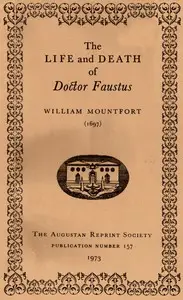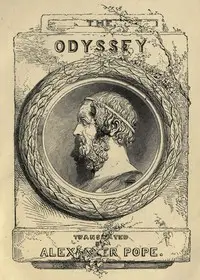"The Tragical History of Doctor Faustus" by Christopher Marlowe is a play about a brilliant scholar who wants more than regular knowledge can give him, leading him down a dark path. Dr. Faustus is tired of what he already knows, so he decides to try magic, hoping it will bring him ultimate power and understanding. He summons a demon named Mephistophilis and makes a deal with the devil, ignoring any possible consequences for his soul. The story focuses on Faustus's journey as he struggles with right and wrong, all while getting closer to paying the price for his deadly deal.

The Tragical History of Doctor Faustus From the Quarto of 1616
By Christopher Marlowe
A scholar hungry for forbidden knowledge makes a perilous pact with the devil, trading his soul for ultimate power.
Summary
About the AuthorChristopher Marlowe, also known as Kit Marlowe, was an English playwright, poet, and translator of the Elizabethan era. Marlowe is among the most famous of the Elizabethan playwrights. Based upon the "many imitations" of his play Tamburlaine, modern scholars consider him to have been the foremost dramatist in London in the years just before his mysterious early death. Some scholars also believe that he greatly influenced William Shakespeare, who was baptised in the same year as Marlowe and later succeeded him as the preeminent Elizabethan playwright. Marlowe was the first to achieve critical reputation for his use of blank verse, which became the standard for the era. His plays are distinguished by their overreaching protagonists. Themes found within Marlowe's literary works have been noted as humanistic with realistic emotions, which some scholars find difficult to reconcile with Marlowe's "anti-intellectualism" and his catering to the prurient tastes of his Elizabethan audiences for generous displays of extreme physical violence, cruelty, and bloodshed.
Christopher Marlowe, also known as Kit Marlowe, was an English playwright, poet, and translator of the Elizabethan era. Marlowe is among the most famous of the Elizabethan playwrights. Based upon the "many imitations" of his play Tamburlaine, modern scholars consider him to have been the foremost dramatist in London in the years just before his mysterious early death. Some scholars also believe that he greatly influenced William Shakespeare, who was baptised in the same year as Marlowe and later succeeded him as the preeminent Elizabethan playwright. Marlowe was the first to achieve critical reputation for his use of blank verse, which became the standard for the era. His plays are distinguished by their overreaching protagonists. Themes found within Marlowe's literary works have been noted as humanistic with realistic emotions, which some scholars find difficult to reconcile with Marlowe's "anti-intellectualism" and his catering to the prurient tastes of his Elizabethan audiences for generous displays of extreme physical violence, cruelty, and bloodshed.

![Faust: a Tragedy [part 1], Translated from the German of Goethe by Johann Wolfgang von Goethe](https://cdn.a2-host.cloud/aVXahljiexfZhC4Ds0TB_hpZCZ5J2CMZmS_FgD07FHk/rs:fill:215:325:0/g:ce/aHR0cHM6Ly9zcC1hc3NldHMuczMudXMtd2VzdC0wMDQuYmFja2JsYXplYjIuY29tL2Jvb2svMTQ0NjAvRmF1c3RfYV9UcmFnZWR5X3BhcnRfMV9UcmFuc2xhdGVkX2Zyb21fdGhlX0dlcm1hbl9vZl9Hb2V0aGVfY292ZXIuanBn.webp)



![Faust [part 1]. Translated Into English in the Original Metres by Johann Wolfgang von Goethe](https://cdn.a2-host.cloud/y-MkV3aFt2tKEbdp7VCDtzUhX9qKc82D4dZAE78xr7U/rs:fill:215:325:0/g:ce/aHR0cHM6Ly9zcC1hc3NldHMuczMudXMtd2VzdC0wMDQuYmFja2JsYXplYjIuY29tL2Jvb2svMTQ1OTEvRmF1c3RfcGFydF8xX1RyYW5zbGF0ZWRfSW50b19FbmdsaXNoX2luX3RoZV9PcmlnaW5hbF9NZXRyZXNfY292ZXIuanBn.webp)












